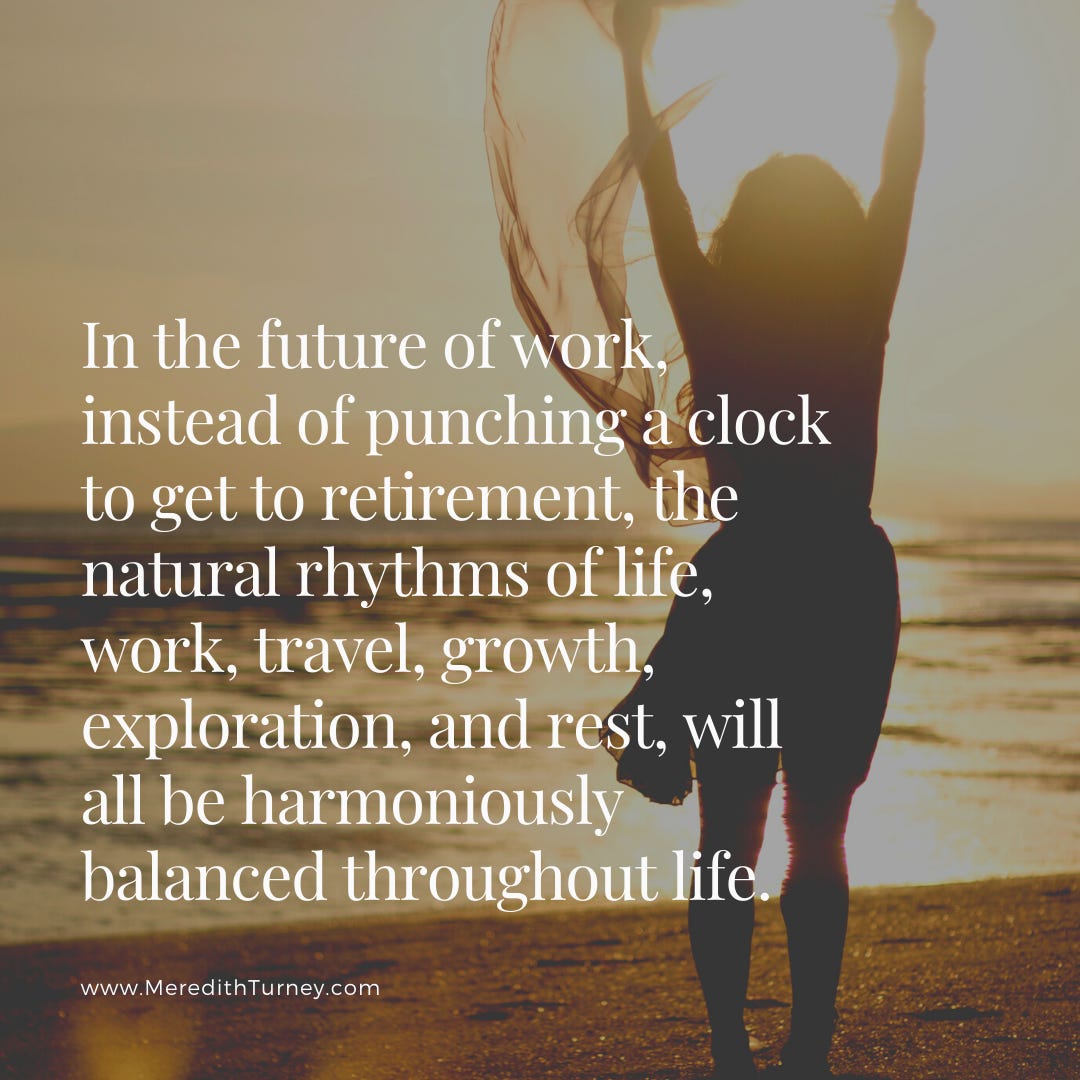Unlimited Vacation and Mandatory Sabbaticals
The future of work will prioritize rest, restoration and creativity
As we enter the summer of 2020, many of us are considering our summer vacation plans. How and where do you vacation in the midst of a global pandemic and so much social unrest? Just like work, shopping, exercise and everything else in life right now, we’re reconsidering how to adjust to new circumstances when it comes to vacation. But let’s take a step back and look at why we vacation as well.
What is the purpose of vacation from work? Vacations are meant to give us a respite from our regular schedules. Aside from weekends that give us much-needed downtime from busy schedules during the work week, vacations and PTO (Paid Time Off) are more than a perk to attract candidates to a company. Ideally, we travel somewhere that invigorates and/or relaxes us. Vacations can inspire creativity and a new perspective that we can then take back with us to the workplace to infuse our work with fresh energy.
Some companies have instituted unlimited vacation as a benefit for their teams. Not only does this help their bottom line (avoiding costly cash-outs for unused PTO when an employee leaves), it empowers employees to manage their own time. It builds trust between leadership and their teams because they each know they will be responsible with how much time they take off while still meeting company goals.
But stepping back even further, is this new trend of unlimited vacation days really helping achieve the overall goal of rest, restoration and creativity that vacation is intended to foster?
According to Neil Pasricha and Shashank Nigam, the corporate vacation system as we know it is fundamentally broken. In an “unlimited vacation” culture, employees often feel guilty about taking more time than peers for fear of looking like they are abusing the system or slacking at work. So no one ever really benefits from the “unlimited” offering. And also, most people are terrified of the amount of catch-up they will have to do when they return from vacation. Who can truly enjoy sitting on a beach in Hawaii knowing when you return you’ll be working double time just to catch up?
We don’t yet have all the answers on how to fix this chronic problem in the workplace. But we do know that stress, fatigue and general work overload is increasing. So it’s imperative we figure out how to change the way we work—and especially how we ensure each of us has sufficient time to rejuvenate and spark more creativity through rest and vacation.
I believe the future of work will not only mean more remote work options, which provide greater work/life balance, it will also look at human life development holistically.

In his TED Talk, “The Power of Time Off,” Stefan Sagmeister shares how he goes on a work sabbatical every 7 years. He reasons that we spend the first 20 years of our life learning, the next 40 years working with only a couple weeks “off” annually, then we wait until the last 15 years of our life to actually rest and explore the world. Why not build that exploration and growth into those prime years instead of banking it for when you’re older?
As a conscious leader, how can you create a workplace that not only produces amazing services and products, but gives back to the world by looking at employees’ lives holistically? How can you nurture and grow them so they become human beings who thrive and equally give back to their communities and the world?
What would your team look like if instead of just taking a couple weeks to sip Mai Tais somewhere, then returning to the office with nothing more than a tan and some photos, they actually took substantial time to learn and grow and explore? What kind of energy, wisdom and creativity would they bring back to your team? What would that mean for your company? The sabbatical investment is minimal compared to the human investment and what it could unleash for your team.
Some employers may argue that their company doesn’t operate like a university where regular sabbaticals are normal, and they have to turn a profit, otherwise what’s the point of building a business? True. Turning a profit and continually building is inherent to growing a business. But what if your business was more than what we have known businesses to be in the past?
You can change how your company functions. You can create a new paradigm for how humans work, live, and thrive. What if investing in people was part of your business model? What if you created a place where employees knew they would be doing more than traditional work? They would be part of a team that invests in their personal growth and development. And instead of punching a clock to get to retirement, the natural rhythms of life, work, travel, growth, exploration, and rest, would all be harmoniously balanced throughout life.
Sound too good to be true? It doesn’t have to be. Conscious leaders can make this happen. They can create something new. They can shift the paradigm. Are you one of those leaders ready to help shape the future?
Work happy. Live happy. BE happy.
Meredith
Meredith’s coaching helps conscious leaders step courageously into the future of work. Contact her to develop your conscious leadership and transform your organization into the workplace of the future.
And if you haven’t already, please sign up for this newsletter so you’ll receive the latest insights on conscious leadership, remote work success, remote team building, and the future of work.
Connect with Meredith on Instagram, Facebook,YouTube, and LinkedIn for video content related to these topics.


